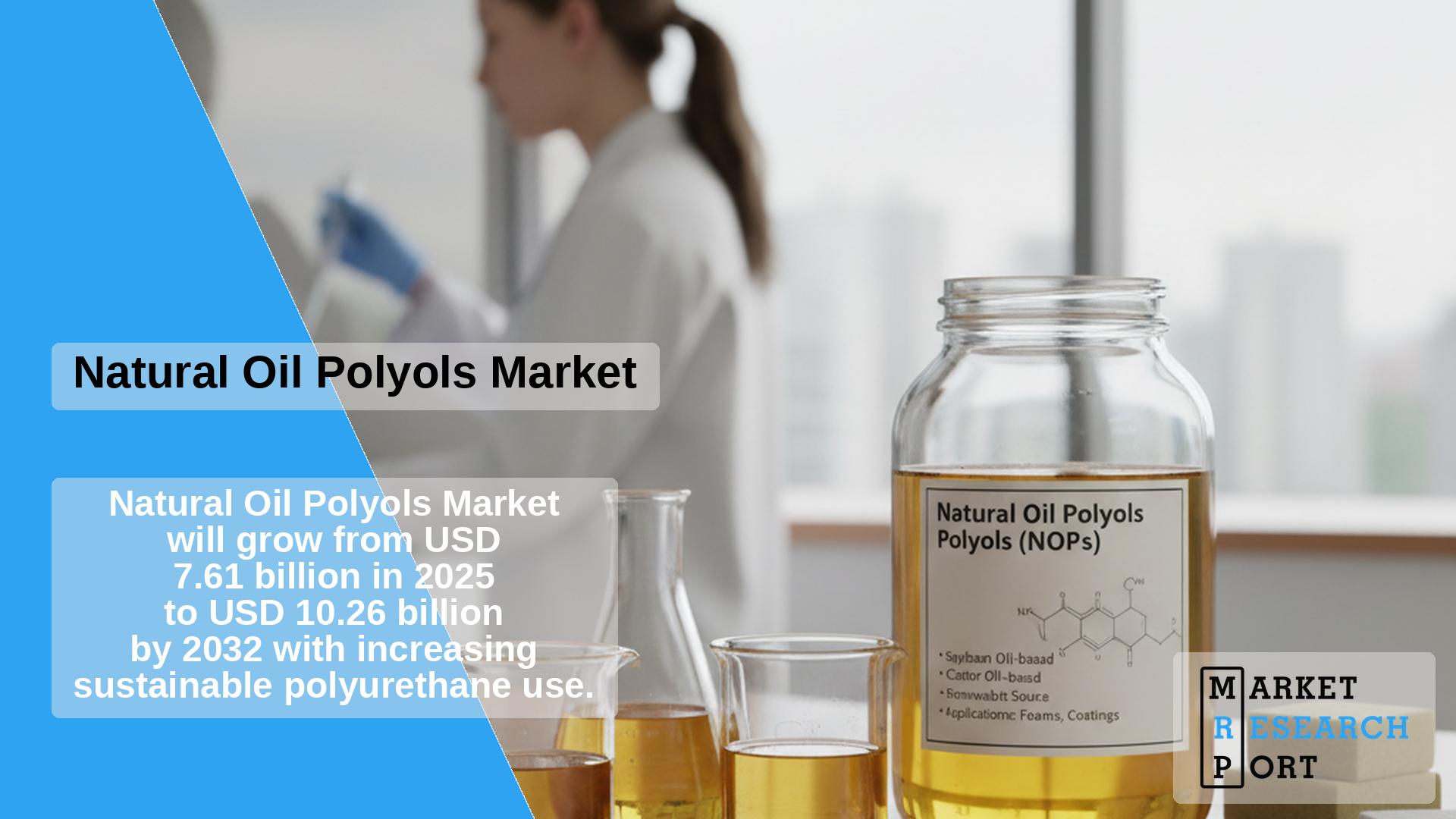
The global natural oil polyols market reached USD 7.52 billion in 2025 and is projected to reach USD 12.92 billion by 2030, registering a CAGR of 8.3% from 2025 to 2030. The market is expanding rapidly, fueled by the automotive, construction, and electronics sectors’ increasing demand for environmentally sustainable, lightweight, and durable components—especially in markets with strong growth like China, India, and Southeast Asia. The widespread move towards bio-based polyurethane foams in vehicle interiors, building insulation, and consumer electronics is significantly boosting sector growth.
Natural oil polyols are eco-friendly polyols derived from renewable resources such as soy, castor, palm, and canola oils. Their expanding usage in polyurethane foams, adhesives, elastomers, and surface coatings is being propelled by rising environmental regulations, green manufacturing policies, and consumer demand for low-carbon, non-toxic materials. Specialty applications in personal care and skincare—especially in markets like the U.K., India, and France—further support long-term growth as the bio-based segment outpaces petrochemical polyols.
The transition towards renewable, plant-based feedstocks is further supported by volatile crude oil prices and high cost fluctuations for traditional petrochemical-based polyols. Innovation in extraction technologies for high-purity soy, castor, and palm oil polyols is also helping to lower prices and improve the quality of sustainable polyurethane solutions globally.
The construction segment dominated the market with 32.6% of global revenues in 2025. Natural oil polyols are increasingly utilized in rigid polyurethane foams for high-performance insulation in building envelopes, walls, and roofing systems. Robust growth in residential and non-residential construction worldwide is fueling continued demand for bio-based insulation and composite products.
The furniture and interiors segment maintained strong adoption for making high-comfort, durable, and resilient foam cushions, bedding, and carpets. Growth in the electronics, appliances, and personal care end-markets has also accelerated polyurethane adoption built on sustainable polyols.
Soy oil polyols accounted for the largest share of 36.8% in 2025. Their multifunctionality—ranging from animal feeds and processed foods to plastics and flexible foams—continues to drive global demand. Castor and palm oil polyols also expanded their market presence, with palm oil favored in Southeast Asia for its cost advantages and utility in rigid foam and adhesives. Rising innovation in alternative vegetable polyol sources continues to diversify the product mix.
North America led the natural oil polyols market in 2025, with a 45.3% share, driven by robust growth in construction, automotive manufacturing, and home electronics. Stringent biofuel mandates and energy-efficiency standards are supporting increased adoption of bio-based polyurethane foams.
Europe is seeing steady expansion as leading automakers and appliance manufacturers invest in greener materials. The region benefits from strong policies supporting sustainable manufacturing and low-emission construction.
Asia Pacific is experiencing rapid capacity growth, with major companies expanding operations in China, India, and Japan. Low raw material costs, abundant labor, and heavy appliance production make the region an attractive hub for multinational investments in bio-based polyurethane solutions. Rising electronics and automotive production in Asia, coupled with growth in the personal care sector, is driving further market gains.
Industry trends in Central and South America and the Middle East & Africa remain positive, supported by construction booms, appliance demand, and rising awareness about low-carbon building products.
Competitive activity centers around capacity expansions, new product development, supply-chain integration, and mergers to secure access to plant-based feedstocks. Leading organizations are also investing in R&D, green chemistry, and partnerships with biotechnology firms to gain eco-certifications and respond to sustainability-focused consumer markets.
| Report Attribute | Details |
| Market size value in 2025 | USD 7.52 billion |
| Revenue forecast in 2030 | USD 12.92 billion |
| Growth rate | CAGR of 8.3% from 2025 to 2030 |
| Historical data | 2019–2024 |
| Forecast period | 2025–2030 |
| Quantitative units | Revenue in USD billion, volume in kilotons, and CAGR from 2025 to 2030 |
| Report coverage | Market revenue, competitive ranking, product trends, technological advancements |
| Segments covered | Product, application, region |
| Regional scope | North America; Europe; Asia Pacific; Central & South America; Middle East & Africa |
| Country scope | U.S.; Canada; Mexico; UK; Germany; France; Italy; Spain; Russia; China; Japan; India; South Korea; Thailand; Brazil; Argentina; Saudi Arabia; South Africa |
| Key companies profiled | Cargill, Incorporated; BASF SE; Jayant Agro Organics Ltd.; Stepan Company; Elevance Renewable Sciences Inc.; Biobased Technologies; Emery Oleochemicals; Mitsui Chemicals, Inc.; Vertellus |
How large is the natural oil polyols market in 2025?
The global market was valued at USD 7.52 billion in 2025.
What is the growth outlook for natural oil polyols through 2030?
The market is anticipated to grow at a CAGR of 8.3% from 2025 to 2030, reaching USD 12.92 billion by 2030.
Which product segment holds the largest share?
Soy oil polyols accounted for 36.8% of the market in 2025.
Who are the leading players in the natural oil polyols market?
Key industry participants include Cargill, Incorporated; BASF SE; Jayant Agro Organics Ltd.; Stepan Company; and Emery Oleochemicals.
What’s driving the growth of natural oil polyols?
Major factors include the shift toward sustainable and bio-based feedstocks, growing eco-friendly construction and automotive trends, and ongoing regulatory pressure to reduce the footprint of conventional plastics and foams.